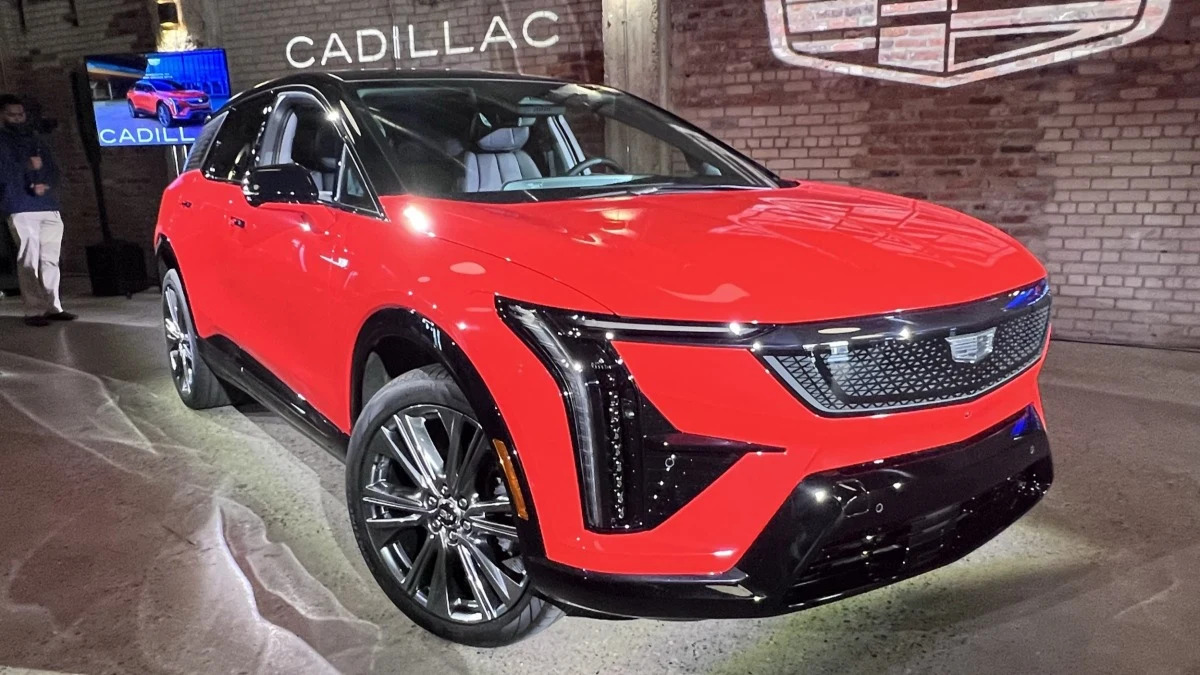Early order guides have divulged pricing for the 2025 Cadillac Optiq, the crossover slotting into the lineup under the Lyriq to become Cadillac’s entry-level battery-electric offering. Introduced in May, the automaker said it would start at around $54,000 and come with standard dual-motor all-wheel drive. The initial figures are right there after the $1,495 destination charge, the four trims and their MSRPs starting at:
- Luxury 1: $54,390
- Sport 1: $54,990
- Luxury 2: $56,590
- Sport 2: $57,090
Every Optiq comes with an 85-kWh battery running motors with a combined output of 300 horsepower and 354 pound-feet of torque. Range is estimated at 300 miles on a full charge. Cadillac still hasn’t put a number to the maximum charging rate, but says drivers should get about 79 miles for every ten minutes of being plugged in to a DC juicer.
Those who keep track of Lyriq prices might think the Optiq sits surprisingly close to its big brother; a 2024 Lyriq in entry Tech trim starts at $58,590 after destination, a $4,200 difference. Lyriq order guides show the Tech trim is retiring for 2025. The Lyriq Luxury 1 trim becomes the entry-level next year and will start at $59,990 after destination. Assuming this is what shows up on window stickers later this year, the 2025 Lyriq climbs by $1,400 compared to 2024, and will be $5,600 more expensive than the Optiq Luxury 1. The base Lyriq comes with rear-wheel-drive, though. The 2025 Lyriq Luxury 1 AWD starts at $63,490, a $9,100 rise over the base Optiq. And don’t be surprised if the eventual difference is even greater, since these Lyriq prices are calculated with a given destination of $1,395, which is $100 less than the Optiq’s destination charge. We have a feeling that will change.
Cadillac says buyers will be able to claim the full $7,500 tax credit, the Optiq going into production at GM’s Ramos Arizpe plant in Mexico. The affordable trims will be late availability, so be ready to fork out for the Luxury 2 and Sport 2 grades if looking to buy before the year is out.
The Optiq doesn’t sacrifice brand pillars for being less expensive. It’s decidedly luxury, an illuminated black crystal grille greeting an owner in the way the Lyriq does. Flush door handles and a layered-glass rear quarter-panel window with a pattern reminiscent of Cadillac’s Mondrian-style crest feature along the flanks. In back, vertical light bars frame the backlight, with another set below on the lower liftgate. It goes without a rear window wiper, but does have spoilers above and below the glass.
Inside, the dash is dominated by a 33-inch LED display in 9k resolution serving as both infotainment and instrument panel. It uses Google Built-In technology, with integrated Google Assistant and Google Maps (Apple CarPlay is no longer available, but individual iPhone apps will embed in the Google Built-In system). A light bar across the top of the wheel provides information from the standard Super Cruise hands-free highway driving assist. For tunes, the standard AKG audio system runs through 19 speakers with Dolby Atmos capability.
A cantilevered center console is covered in fabric woven from recycled yarn, a material found throughout the cabin. The interior’s “PaperWood” veneer is made from tulip wood and recycled newspaper. There are many open (and softly illuminated) storage areas throughout, lined with a soft-touch, non-woven “Tide” fabric made from repurposed materials. As for roominess, the floor feels a little high — not uncommon in most EVs with the battery under the floor — but legroom is ample in both rows. Second-row headroom is a bit scarce, though. Behind the second row is a generous-for-the-segment 26 cubic feet of cargo space, as well as some additional storage space underneath the load floor. Cargo volume expands to 57 cubic feet with the second row folded.
Every Optiq will also come with a nicely stocked list of safety equipment, including front pedestrian and bicyclist braking, reverse automatic braking, auto high beams, blind zone steering assist, and rear cross traffic braking.

